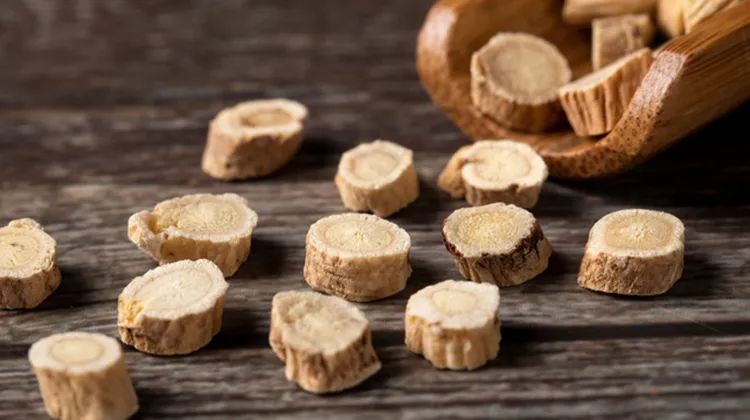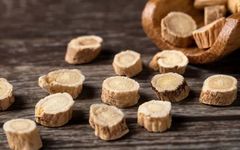Most people know that Huang Qi (Astragalus) is used to tonify Qi, and as a key herb for Qi replenishment, its honey-fried form can enhance its ability to tonify the middle and benefit Qi. It is widely used in clinical practice, but Huang Qi has many other benefits beyond just tonifying Qi.
1. Benefit the Lungs
Huang Qi is slightly warm in nature and enters the lungs, making it a key herb for tonifying lung Qi.
It is primarily used for insufficient lung Qi, weakened defensive function, and conditions where external pathogens invade due to deficiency, such as colds, rhinitis, chronic cough, shortness of breath, and fatigue.
Huang Qi can enhance the body’s immune function, suppress abnormal immune responses, and improve disease resistance, especially effective for conditions like allergic rhinitis, urticaria, bronchial asthma, and eczema, where normal immunity is low or abnormal.
2. Tonify the Middle
Huang Qi is sweet and warm, good at entering the spleen and stomach, and its sweet flavor can nourish the earth, promoting digestion and transformation, making it the first choice for tonifying the middle and nourishing the earth.
It is used for spleen and stomach deficiency, with symptoms like fatigue, stomach pain, diarrhea, and vomiting.
Due to its ability to nourish the organs and strengthen the body, it can effectively adjust and promote gastrointestinal function, thus having excellent efficacy for digestive tract diseases.
3. Raise Yang
Huang Qi is warm in nature, with a light and uplifting energy that is good at raising Yang Qi.
It is mainly used for conditions where Yang Qi has descended and cannot be raised, leading to symptoms like organ prolapse due to the inability to transport and nourish the organs with the essence of food and fluids.
Huang Qi contains various nutrients that strengthen the body and promote organ function, thus having certain efficacy for conditions like gastric prolapse, renal prolapse, and uterine prolapse.
4. Promote Water Metabolism
Huang Qi tonifies the middle, normalizing the central pivot, allowing for smooth communication between the upper and lower parts of the body, warming Yang and benefiting Qi, thus promoting the flow of water through the three burners.
It is primarily used for Qi deficiency, abnormal fluid metabolism, and Yang deficiency leading to edema. Conditions like acute and chronic nephritis, mucinous edema, idiopathic edema, and hepatic or cardiac edema can all be treated.
Huang Qi has a significant diuretic effect, accelerates the disappearance of urinary protein, protects the liver, and prevents the reduction of liver glycogen, making it effective for nephritis and hepatic edema.
5. Warm Yang
Huang Qi is warm in nature and has a strong ability to warm and tonify the original Yang, especially effective for warming and tonifying heart Yang.
It is mainly used for heart Yang deficiency, with symptoms like palpitations, chest pain, and cardiac edema.
Huang Qi can enhance myocardial contractility, improve heart function, and has a significant cardiotonic effect.
6. Detoxify (Promote Tissue Regeneration)
The Shen Nong Ben Cao Jing states that Huang Qi “is used for abscesses and chronic non-healing wounds, expelling pus and relieving pain,” and it has been referred to as the “essential herb for wounds”.
It is commonly used for abscesses and sores caused by Qi and blood deficiency, especially when pus forms but does not drain or when wounds do not heal after breaking, such as in peptic ulcers, chronic gastritis, oral ulcers, ulcerative colitis, Behçet’s disease, and skin diseases that do not heal after ulceration.
Huang Qi can enhance the phagocytic function of the reticuloendothelial system and has inhibitory effects on cocci and bacilli, thereby enhancing local disease resistance and promoting the healing of local lesions.
7. Activate Blood Circulation
Huang Qi is warm and good at moving, can benefit Qi and warm Yang, stimulating blood circulation and preventing stagnation, thus having a significant blood-activating effect.
Clinically, it is mainly used for various conditions caused by blood stasis in the brain, such as transient ischemic attacks, vertebrobasilar insufficiency, and cerebral arteriosclerosis, leading to dizziness, headaches, and hemiplegia from stroke.
Due to its ability to stimulate the central nervous system, improve blood circulation, and promote the recovery of brain cell function, it can treat ischemic cerebrovascular diseases.
8. Astringe and Control
Huang Qi, due to its strong Qi tonifying ability, has a good astringent effect, controlling the leakage of blood and body fluids.
It is commonly used for bleeding and excessive loss of body fluids due to Qi and blood deficiency, such as chronic bleeding from organs, diabetes insipidus, nocturnal emissions, spermatorrhea, spontaneous sweating, and night sweats.
The components in Huang Qi, such as glucuronic acid and various amino acids, have a strengthening effect and can replenish the protein components lost due to spontaneous sweating, as well as block skin secretion pores to inhibit excessive sweating, thus having a sweating-stopping effect.
9. Generate Blood
The Ben Cao Gang Mu states, “Huang Qi is sweet, warm, and purely Yang, with five uses, including… activating blood and generating blood…”
It is commonly used for blood deficiency caused by various reasons, such as anemia from various causes and decreased blood cells after chemotherapy for malignant tumors.
This is because Huang Qi can promote the proliferation of normal precursor cells in the bone marrow, and the folic acid content in Huang Qi is essential for red blood cell synthesis, thus Huang Qi can generate and nourish blood.
10. Quench Thirst
The Bie Lu states that Huang Qi “replenishes the deficiencies of men, alleviates fatigue and weakness, quenches thirst, relieves abdominal pain, diarrhea, and benefits Qi and Yin.”
Clinically, it is used to treat the weight loss and thirst associated with diabetes, as Huang Qi can adjust the body’s immune state, suppress abnormal immune responses of the pancreas, and lower blood sugar.
11. Induce Sweating
Huang Qi can benefit Qi and nourish blood while also benefiting Yin, and it can elevate Yang Qi, thus replenishing the source of sweat to induce sweating.
Clinically, it is often used for conditions of Qi and blood deficiency, external invasion of wind-cold, where sweating cannot occur, and for conditions caused by imbalances of Yin and Yang in Qi and blood, leading to dysfunction of sweat glands, such as in cases of weak body with colds, autonomic dysfunction, and Sjögren’s syndrome.
12. Disperse Bi Syndrome
Huang Qi is warm in nature, moves without restraint, and reaches both internally and externally, warming the meridians, activating blood, and unblocking collaterals, thus having the effect of dispelling wind, scattering cold, and eliminating dampness.
Clinically, it is widely used for various wind-cold-damp Bi syndromes, such as joint pain from arthritis, muscle pain, and neuralgia caused by Qi and blood deficiency, invasion of wind-cold-damp evil, and blood stasis obstructing the collaterals.
Warm Reminder:This account aims to promote traditional Chinese medicine culture. The herbal formulas mentioned in the text are for learning and exchange purposes only.

